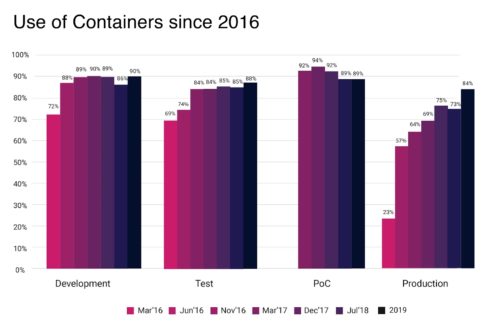
Cloud-native deployments are now the norm. According to CNCF’s community survey, cloud-native projects are increasingly being deployed in production.
The CNCF community survey was conducted in September and October 2019, and the company received 1,337 responses. The goal of the community survey is to understand where and how cloud native technologies are being adopted, the CNCF explained.
According to the survey, many cloud-native projects have reached over 50% use in production. Kubernetes is used by 78% of respondents, Prometheus by 72%, CoreDNS by 69%, Fluentd by 64%, and containerd by 53%.
Use of containers in production has also increased significantly. This year, they found that 84% are using containers in production, which is up by over 15% from 2018. In 2016, only 23% of companies were using containers in production.
In addition, service meshes are beginning to take off. A service mesh is an infrastructure layer that is used to enable communication between distributed applications.
According to the survey, 18% of respondents are currently using a service mesh in production. Another 47% of respondents are considering using one.
Of those using or evaluating service meshes, Istio is currently the most popular, followed by Linkerd, Consul, Netflix OSS Zuul, SuperGloo, Grey Matter, and Vamp.
“While use in production is still rather low with 18% of those who responded indicating they use a service mesh project, 47% are evaluating the use of a service mesh. Service mesh technology is still rather new, and we are seeing that half of respondents are already evaluating this technology. In our future surveys, we expect to see production use climb over the next few years,” the report stated.
The report also found that the increase in the number and reliability of CI/CD tools has led to a decrease in manual release cycles and has accelerated release cycles. In 2018, 15% of respondents were doing daily release cycles compared to 27% now, and 20% were doing weekly release cycles compared to 28% now. They found that hybrid models also increased in 2019 to 41%, from just 25% in 2018.








